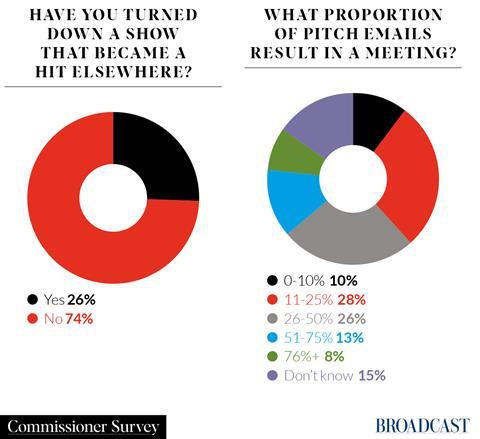Respondents reveal the ups and downs of maintaining good relations with producers, explain why ideas can get stuck in limbo and share the reality of receiving a tsunami of pitches
Handling the volume of pitches is a vital part of a commissioner’s role, but our survey reveals it is also among the most stressful elements of the job. An eyeopening half of all respondents admit to feeling overwhelmed by the sheer number of pitch emails hitting their inboxes, as they attempt to navigate a sizeable supplier base.
“I could spend two days or more out of my week reading and responding to new pitches, which I just don’t have the time to do,” says one commissioner. “The number of indies has grown massively and therefore the number of pitches in the system is enormous.” As another more vividly puts it: “There is a constant uninterrupted flow of emails. Often it feels like standing under Niagara Falls with your mouth open.”
This is not just a problem for those new to the game, either. Intriguingly, the more experienced the respondent, the more likely they are to feel this way. Of those commissioners with at least six years’ experience, 55% feel swamped – a proportion that increases to 80% when only the most veteran (15-plus years’ experience) are considered.
In comparison, the proportion falls to 43% for those with six years or less, and down to 37% for the least experienced (three years or less).
Perhaps those who have racked up the most time as a tastemaker are also those most concerned about damaging relationships – many of which they will have developed over several years – or perhaps they can remember a time when the indie sector had fewer companies and the sheer number of ideas was less intimidating. Those earlier on in their commissioning careers may never have known any different.
“I remember what it was like, but I already work 10 to 12 hours most days, so I can’t do any more”
To an extent, the significant workload is also a by-product of most commissioners taking a democratic approach to their work. Many reject solutions such as only accepting pitches from decorated producers as creatively bereft, while some directly empathise with their suppliers – recalling when the shoe was on the other foot and they were the frustrated producer demanding answers from a hard-to-reach commissioner.
“I remember what it was like, but I already work 10 to 12 hours most days, so I can’t do any more,” says one senior multichannel commissioner.
Several commissioners point to their teams being understaffed, with the need to service bulging slates of existing shows reducing their capacity to hunt for new hits. “The more pressing demands of shows in production can often trump development or the ability to respond to new ideas,” says one PSB commissioner.

Two-thirds of respondents always try to provide meaningful guidance when rejecting an idea, with just under a quarter giving detailed reasons for not pursuing a project.
However, several cite frustrations around the types of email pitches they receive – the most frustrating being those that comprise several loose top lines and no clear creative direction, leaving commissioners with little scope to provide useful feedback. These are usually met with a polite but firm ‘no thanks’.
“This makes indies cross and frustrated at the lack of qualitative feedback, but pitching like that doesn’t foster good relationships and, if anything, it undermines our confidence in the supplier, because it demonstrates they haven’t got a clear vision,” says one experienced PSB head of department.
On average, the vast majority (85%) of commissioners say they will have responded to an idea within a month, with only 15% admitting they take longer, but there is truth to the perennial indie gripe that some ideas get stuck in the system.
Some respondents admit that they find their internal structures too slow, while others struggle to get clear answers from seniors and are forced to bide their time before making their internal pitch. Just under a third (29%) say this is the main reason for keeping an idea in development limbo.
As one PSB commissioning editor puts it: “A commission is a thing of many moving parts. Getting the planets to align is tricky, but getting a decision from upstairs is harder.”

Timing is crucial – 30% are prepared to keep an idea on hold until conditions make a greenlight more likely. “It might be the case that we’re waiting for developments in similar territories to deliver,” explains one senior exec. Another says they can be hamstrung by “a lack of certainty with channel strategy”, especially if they receive a glut of email pitches at one time, illustrating that commissioning editors and their creative leaders may not always be aligned.
Ultimately, the range of comments about keeping ideas on hold suggests each case is different and plenty of responses say multiple factors are often at play.
One strikingly honest commissioner describes it like this: “The most common reason for delay is that the idea is perceived to be ‘quite good’ rather than ‘brilliant’… and so it takes a while for everyone to get behind spending millions of pounds on it. ‘Is there definitely nothing better’ is a reasonable question, and can take time to mull over.”
Need for transparency
Commissioners see transparency as key to their credibility. A whopping 94% say they have no problem admitting to indies when they have made a mistake.“Sure, it happened recently,” says one kids’ TV commissioner. “I wasn’t keen on something in the script but the indie was convinced it would work. When I saw the edit, I told them they were right.”
Another children’s commissioner admits they were “very resistant” to using an inexperienced director but were happily proved wrong when that individual turned out to be an excellent choice.
“We all get things wrong and part of maintaining a relationship of trust is to take responsibility when we do”
A recurring theme is that the best indie/ commissioner relationships are based on trust and respect, and for commissioners that can mean being open about the limits of their skills. “We all get things wrong and part of maintaining a relationship of trust is to take responsibility when we do,” says one respondent, while another states: “I have enough to do without also maintaining a facade of infallibility as well. Not speaking directly wastes too much time.”
That respect works both ways. No respondents say indies reject their feedback outright as creative interference, compared with more than two-thirds (68%) who say producers are very willing to take on input from their commissioner and actively want to collaborate. The remaining 32% say indies are generally open-minded but have their own vision for a show.
Around a quarter of commissioners (26%) say they have turned down a show that went on to be a hit elsewhere. Few of them display any regrets, providing reasons such as the project being wrong for their channel or streamer, or not fitting with other shows on their slate.
WHAT COMMISSIONERS SAY
“Every idea takes time to write up and present, and that effort deserves reciprocal effort from us. Just saying a brief ‘no’ isn’t acceptable.”
“Quick ‘nos’ are easy, slam-dunk ‘yeses’ too. It’s when an idea sits in a crowded territory that it can take time to navigate.”
“If indies push for a quick answer, they might push me to a ‘no’.”
One PSB commissioner helped develop a show that ultimately became a ratings winner elsewhere, but they still count the experience as a positive: “Stronger, more successful indies benefit me in the long run, so I was happy with how it panned out.”
Not all experiences are so upbeat. One frustrated commissioner cites a lack of funds and support at higher level for passing on a hit show, while another says a simple miscommunication led to a good idea ending up elsewhere. “It could so easily have been avoided,” they lament.
Better knowledge base
Most commissioners want indies to be better informed about the channels to which they are pitching – many say they receive ideas that are clearly recycled from previous pitches or are completely inappropriate for their department or channel. Just under half (48%) say indies understand what their channel represents and work their ideas accordingly, but almost the same proportion (46%) say the production sector can misunderstand their channel’s needs.
And while 64% say indies completely or largely understand what they specifically need as commissioners or departments, a sizeable minority of respondents (36%) say their suppliers sometimes, or often, get this wrong.
These statistics are a decent barometer of how commissioners see the current status of their relationships with producers. It is imperfect, challenging and in some cases clearly in need of recalibration: commissioners could be clearer and producers better prepared. But at its best, a healthy dose of respect and a little understanding and empathy on both sides goes a long way towards making these crucial interactions more fulfilling.
Indie relations
- 1
 Currently reading
Currently readingCommissioner Survey: indie relations
- 2
- 3
- 4
- 5
- 6
- 7











No comments yet